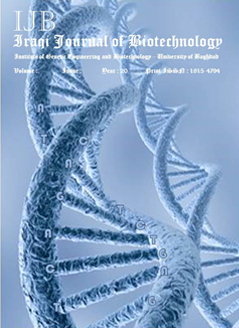Chromosomal Aberrations and Gene Expression Study in Breast Cancer Patients Undergoing Radiotherapy
Abstract
The present study aims to use the chromosomal aberrations and gene expression analysis as biomarkers for detection of the effects of ionizing radiation exposure in breast cancer patients (BC) undergoing radiotherapy about 20-30 Gy locally gamma cells, which may effect DNA of cancer patients. This study was carried out on thirty. Iraqi women patients with breast cancer patients during radiotherapy treatment at Al-Amel National Hospital for cancer Management in Baghdad during time 2-13 years , non-smokers and non- alcoholic, aged (30 - 59 year), with stage (grade) I - III, as well as thirty apparently healthy individuals females collected randomly from population living Baghdad , aged ranged (30 - 59 year) which are non-smokers non- alcoholic as control group. Using two molecular genetic end-points parameters were studied to determine genotoxic effects of radiotherapy in peripheral blood lymphocytes of some Iraqi breast cancer patients and compared with control groups. Investigations were carried out by using the chromosomal aberrations (CA) and gene expression were performed on peripheral blood lymphocytes for breast cancer patients and control groups.The present study showed significant increase (p<0.01) in the unstable chromosomal aberration types (CA) fragment, ring and dicentric chromosomes for the breast cancer patients during radiotherapy as compared with the control group. Also, This study including twenty. Iraqi women patients with breast cancer after radiotherapy treatment about 20-30 Gy locally exposure to gamma rays , aged ( 35 - 55 years), as well as twenty female blood samples, aged (35 - 55 years) which are non- smokers or alcoholic as control group. Total RNA was isolated from blood for BC patients and control groups.The RNA concentration was determined spectrophotometrically by measuring their absorbance that dependent on the ratio A260/A280 of the wavelength, which leads to the determination of RNA purity, which ranged from 1.79-2.1 in two groups. Complementary DNA was used in amplification of genes used in the present study, three types of specialized primer genes were selected for the genes CDKN1A, BRCA1 and BRCA2 which have a relation with ionizing radiation in addition to the primers for internal control (β-actin) genes. Gene expression analysis revealed statistically significant (∆∆Ct comparative Ct method) transcriptional changes in two genes CDKN1Aand BRCA2 up-regulated while BRCA1 gene down-regulated. In conclusion, the results indicated that there is a possibility of using the changes at the level of CA as useful biomarkers for the detection of the effect of radiotherapy in peripheral blood lymphocytes for BC cancer patients. several genes involved in cell cycle regulation and DNA repair were found to be significantly induced by radiation treatment.


